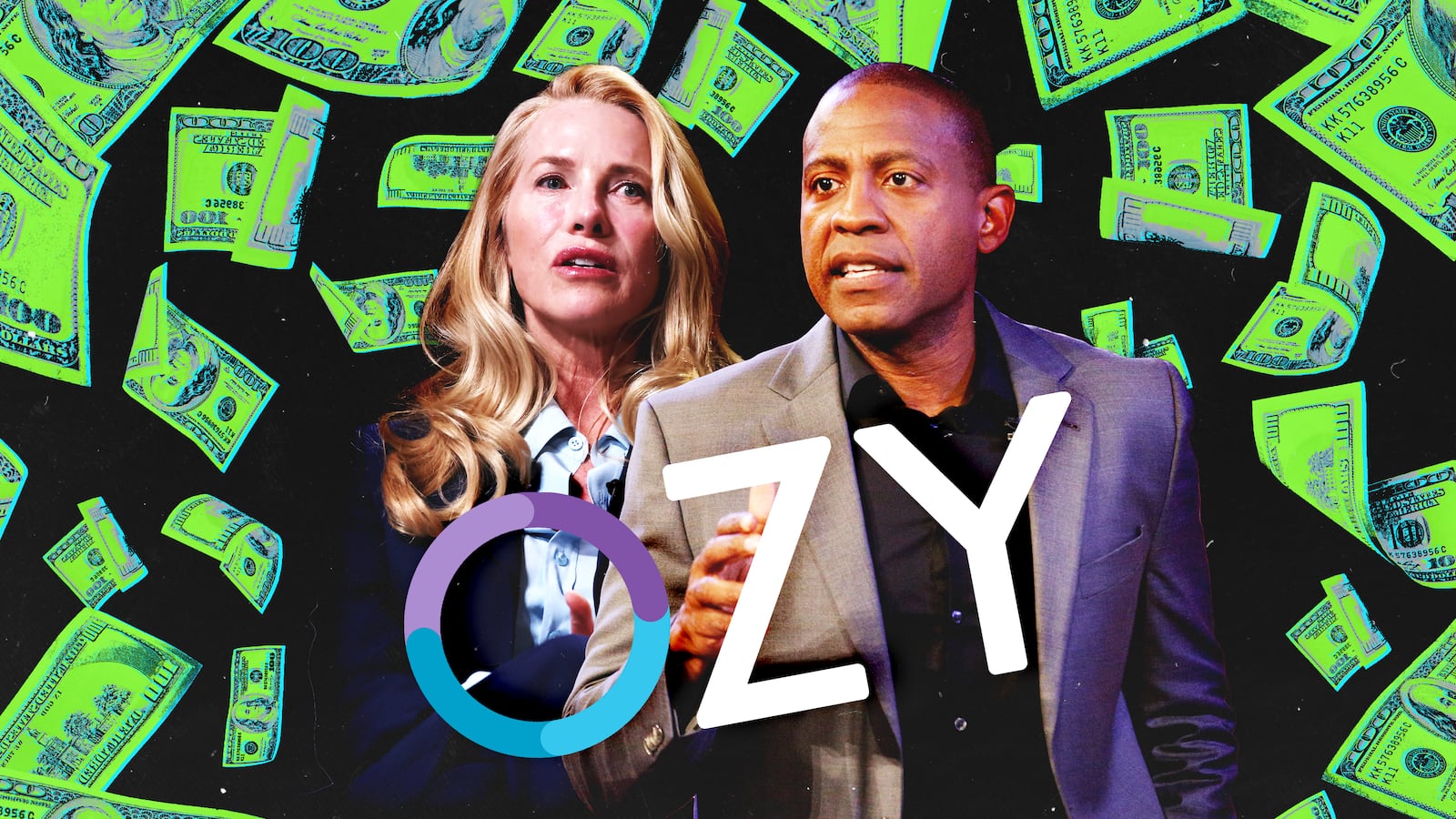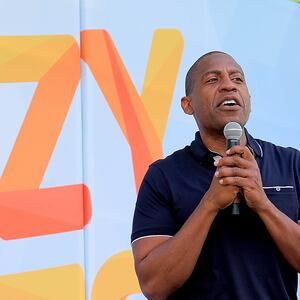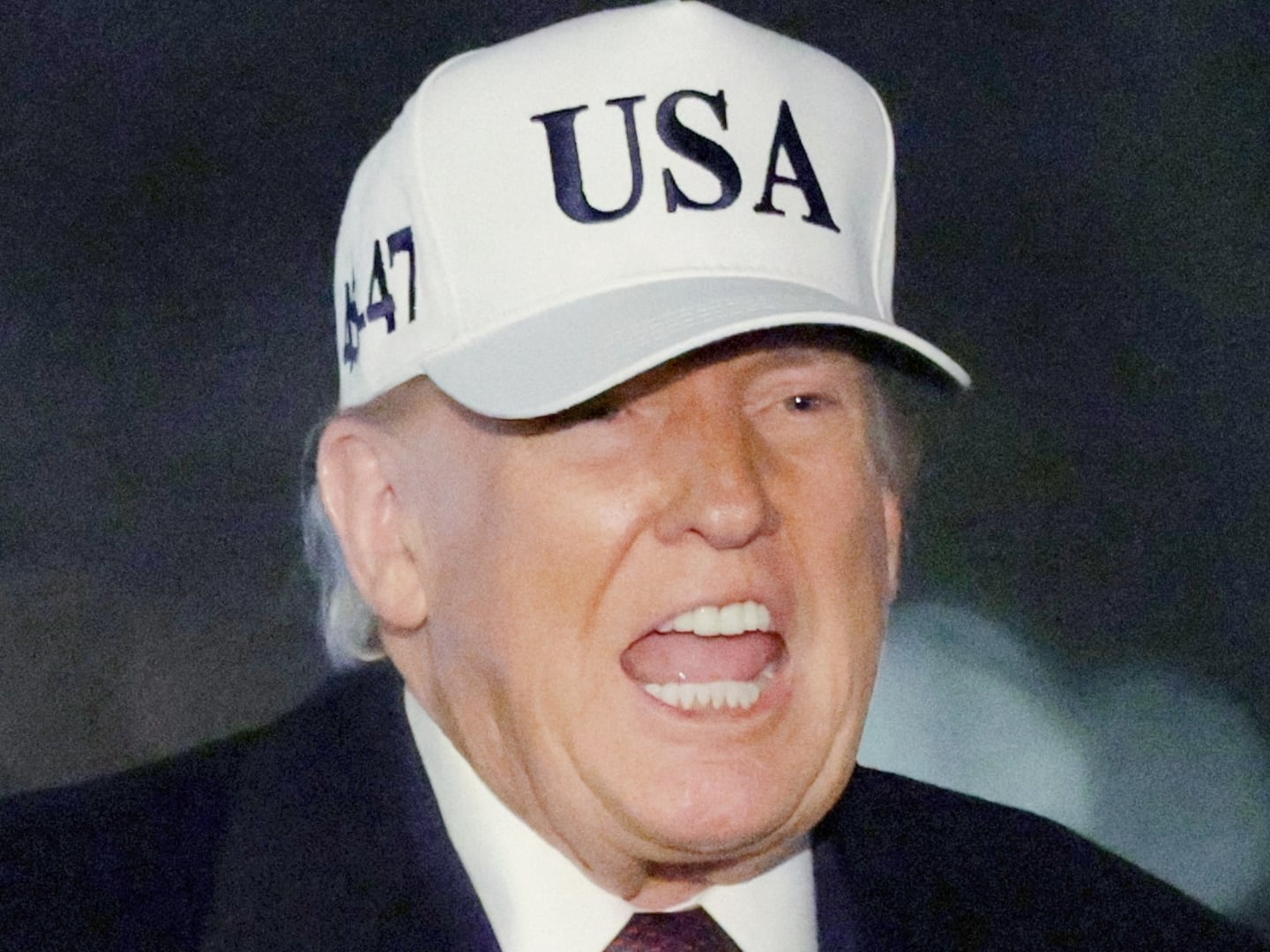In 1995’s Dangerous Minds, Michelle Pfeiffer played a Marine veteran turned inspirational teacher bringing hope to the disadvantaged children of East Palo Alto at Carlmont High School.
That year, the same school saw the start of a more remarkable, real-life drama involving a tech mogul’s wife and a young Stanford Law student. They tutored disadvantaged Carlmont students, but that was just the start of a wild story of celebrity and ambition. One of the two is now a billionaire many times over and is widely respected for her continuing good works. The other sought to parlay funding from his fabulously wealthy friend in an effort to brand himself as the “new Oprah.”
But the story ended in fraud, farce, and accusations of racism—and one of them facing a maximum of 37 years in prison.
The mogul’s wife was Laurene Powell Jobs. She met Steve Jobs in 1989 as a Stanford Business School student and married him in 1991. In 1995, she was expecting their first child.
Her fellow volunteer was Carlos Watson. He had a notable life story: raised in Miami by Jamaican-American parents of modest means, he went to Harvard on a scholarship and moved west to Stanford Law School, class of 1995. He had been an editor of the law review, though not the editor, as he sometimes told people.

Carlos Watson attends a New York Times event with Laurene Powell Jobs, who helped fund Ozy, the failed media company co-founded by Watson.
Neilson Barnard/Getty Images for The New York TimesAfter graduation, Watson moved across the Bayshore Freeway from Stanford to East Palo Alto, a largely minority and economically challenged neighborhood then known as “the murder capital of America.”
“I ran a mentoring problem for young black boys called the Successful Young Black Men’s Mentoring Program and I found that a lot of our kids weren't getting good advice at school about going to college,” he would later testify at his trial. “I started volunteering at [their] high school to help more of the kids figure out what college to go to, how to pay for it, what are these things called SAT exams and eventually I realized that my kids weren't the only kids that didn't have the help.”
To assist other teens, he founded Achieva, a college prep service. He later testified that “as a young entrepreneur in my first company… I got to know Steve Jobs reasonably well.”
He then caught himself.
“Reasonably well is too strong,” he self-corrected. “But I got to learn from him. I got to go watch him at his company. I got to go hear him give his big annual presentations where he debuted things.”
He had gotten to know Laurene Powell Jobs when he became a tutor at Carlmont. They proceeded from their version of Dangerous Minds to co-found a non-profit with much the same goal as Achieva.

Laurene Powell Jobs, who met Carlos Watson while volunteering at a Palo Alto school in the 90s, attends a state dinner in honor of French President Emmanuel Macron with her son, Reed.
Amanda Andrade-Rhoades/Reuters“It's called College Track,” Watson testified. “We now call it a college completion program because we want to be sure that our kids don’t just get into college, but finish and get off to a good start.”
Watson himself got a start on a TV career in 2002, with appearances on Court TV and Fox News, then CNBC and CNN. He was briefly a daytime anchor at MSNBC. A former network executive recalls that Watson had the glittering in his eyes of those who become enchanted with being on television. He also had considerable charm in person. But he just did not quite have whatever it takes to make it as a regular anchor.
So, in 2012, Watson decided to launch a digital platform called Ozy that would feature news and entertainment. Its flagship TV program would be what he seemed to most want, The Carlos Watson Show. He would be interviewing world leaders and trend centers and, of course, celebrities while striving to make himself one. An old friend put up the seed money for his grandest start-up yet.
“OZY's Series Seed round was effectively led by the Emerson Collective, which was the investment group associated with Laurene Powell,” Ozy co-founder Samir Rao later testified. “To the best of my understanding, Carlos and Laurene had a longstanding relationship. They'd known each other, by the time I met Carlos, for 20 years and had partnered on a number of things, including a college-focused nonprofit for underprivileged high school students.”

Carlos Watson records a TV debate at The Bently Reserve on Oct. 29, 2018 in San Francisco. The Ozy website was taken offline roughly four years later.
Kimberly White/GettyHe concluded, “It was through a longstanding relationship that Carlos had brought Laurene into the round.”
Once word spread that Laureen Powell Jobs was investing, numerous other venture capital types kicked in. Watson raised more than $65 million in a series of fundraising rounds.
Just as he foretold, the guests in the The Carlos Watson Show came to include everybody from Hillary Clinton and John Legend to Matthew McConaughey and Malcolm Gladwell. He hosted an annual “Ozy Fest” in Central Park with a line-up that included Alex Rodriguez, Ru Paul, and Chance the Rapper. The new-media venture attracted both seasoned journalists from legacy outlets and young graduates from Ivy League schools. By 2016, the buzz in one elite journalism school was that Ozy was the future and where everyone wanted to work.
The problem: virtually nobody was watching. Ozy lost more money than it could ever raise despite the ultimate Silicon Valley imprimatur of his old friend Laurene. Other failing online media ventures were engaging in such relatively benign deception such as inflating audience figures—an illusion furthered by a blizzard of advertisements on social media. Watson, however, went all in for what prosecutors called “a years-long scheme to defraud investors out of millions of dollars.”

An ad for the Carlos Watson Show, in which Watson is likened to media icons Anderson Cooper and Oprah.
CourtesyWatson contrived for Rao to impersonate YouTube’s head of unscripted planning when phoning into a meeting with Ozy and Goldman Sachs, which was poised to invest $40 million in Watson’s company.
“The defendant Carlos Watson and Rao were in a room together,” the indictment of which he was found guilty says. “Rao used a voice alteration app he had downloaded to his cellular telephone to mask his voice on the call, and impersonated [the YouTube executive].”
The bogus executive told Goldman Sachs that after meeting with Watson, YouTube had supposedly decided to sign Ozy up for a multiple-episode pilot and expected future seasons of The Carlos Watson Show. The prosecutor added that the show had done exceptionally well in terms of viewership and that it was supposedly being considered to become YouTube’s premium talk show.
“These statements were false,” the indictment notes.
Watson was indicted for conspiracy to commit securities fraud, conspiracy to commit wire fraud, and aggravated identity theft. He was further alleged to have conspired with Rao to forge the signature of a cable company executive on a bogus contract for numerous episodes. The indictment says the spurious document was then sent to a bank, with a copy to Ozy’s chief financial officer, who immediately quit.
“This is fraud,” the indictment quotes the CFO telling Watson in an email. “This is forging someone’s signature with the intent of getting an advance from a publicly traded bank.”
The email continued, “To be crystal clear, what you see as a measured risk—I see as a felony.”

Carlos Watson was criminally charged for plotting to con investors out of millions.
Jane Rosenberg/ReutersAt his arraignment, Watson was freed on bail after putting up his home and sister’s condo. His two adoring sisters and another relative were in court every day of the trial.
The alphabetical list of possible witnesses the defense submitted to the court included Laurene Powell Jobs. But she was never called, perhaps because, among other things, she could testify that Watson was less than forthcoming about the bogus YouTube exec. He had told her and the other investors that Rao had been suffering a mental breakdown when he was really just breaking the law.
Rao was also arrested. He pled guilty and testified against Watson, who took the stand on his own behalf. The jury responded to this Carlos Watson show with a unanimous guilty verdict on July 16.
In many other white-collar fraud cases that end in a conviction, the defendants are allowed to remain at liberty until sentencing—and then maybe a short time afterward to get their affairs in order. The mega-fraudster Elizabeth Holmes—who peddled a bogus device that was supposed to detect everything from diabetes to cancer—was allowed to remain free for more than two years after she was convicted. That, even though she had led some people to believe they did not have cancer when they actually did, with disastrous results.
But in Watson’s instance, the prosecutors asked that he be immediately jailed, noting that he had repeatedly perjured himself on the stand, in itself a felony violating the conditions of his bail. He had also repeatedly smuggled a cell phone into the courtroom. He had once falsely insisted to a court security officer (CSO) that he did not have one. He had also loudly accused the prosecution in the hallway of being racist while the jury was leaving for lunch. The house he had put up as collateral had been drained of equity. And, on top of all that, he faced a mandatory minimum sentence of two years, and likely many more.

Carlos Watson pictured leaving a Brooklyn court on Feb. 23, 2023, after being arrested and charged with fraud.
David Dee Delgado/Reuters“Whatever belief that he might have had that he was going to beat this, it's done,” the prosecutor noted. “He has been convicted. The highly theoretical possibility of a long sentence in jail is no longer theoretical. It is looming and it is real.”
Judge Eric Komitee ordered Watson immediately jailed, unless he could come up with a considerably more robust offer of collateral and added guarantees that he would appear for sentencing in November.
“He did perjure himself on the witness stand in ways both large and small during this case, as the jury necessarily found and as was plainly evident when one compares Mr. Watson's testimony to other evidence that we all saw with our own eyes,” the judge said. “We also do have the litany of instances in which Mr. Watson manifested his disregard for the rules of the court and manifested his willingness to say anything, no matter how deeply removed his comments were from reality, including the statement to the CSOs that he had no phone in his bag, which is, you know, not a huge thing, but shows a brazen willingness to look an officer of the court in the eye and say something that was just plainly false.”
Watson’s two sisters were present and one of them voiced her opinion.
“Judge, why are you being racist towards my brother? Why? Fuck.”
The judge left it up to the U.S. Marshals to decide whether Watson would be allowed a moment with his sisters. The marshals nixed it and Watson was led away. He was lodged in the hellish Metropolitan Detention Center in Brooklyn—once home to sex offender Ghislaine Maxwell, and presently home to mega-fraudster Sam Bankman-Fried—and where no visitors are allowed.
His attorney, Ronald Sullivan, submitted a letter to the court saying his client was ready to submit a considerably strengthened bail package and a hearing set for 11 a.m. Friday in Brooklyn Federal Court. The package includes a $2 million bond, but the money is said to come from family members, not the billionaire he tutored with at Carlmont three decades ago.
Meanwhile, Laurene Powell Jobs is still out there doing good, just as she was three decades ago with the kids at Carlmont High along with somebody who seemed to share her mission.








